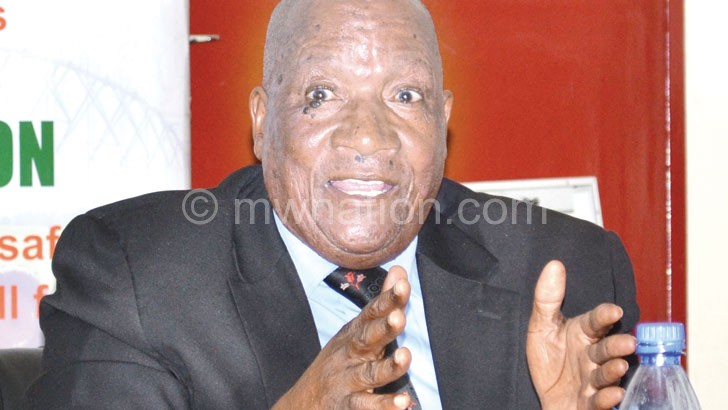Farmers cry foul Over kwacha gain
Farmers Union of Malawi (FUM) has cried foul at the appreciation of the kwacha, saying it suspects an invisible hand behind the gain which will give farmers a raw deal.
Briefing journalists in Lilongwe yesterday, FUM president Alfred Kapichira-Banda said his organisation is disturbed that smallholder farmers—who contribute about 40 percent of the country’s gross domestic product (GDP)—will continue to be the most impoverished.
He said: “What is stressing is that when the farmer was buying the inputs sometime in early January or trading at K750 against a dollar.thereabout, the kwacha was

there is an invisible hand
“But now, when he [the farmer] is taking his produce to the market, the kwacha is at K690. That is excluding the charges which will be incurred in the case of tobacco farmers. Should we say we are moving forward?”
Kapichira-Banda also said Minister of Finance, Economic Planning and Development Goodall Gondwe’s remarks during the Mid-year Budget Review that the point of exchange rate equilibrium had been reached has also sent out a strong message.
He said Gondwe’s remarks and the continued appreciation of the kwacha have threatened markets for most growers due to the anticipated huge losses.
Said Kapichira-Banda: “The union is mindful of the fact that since April 2012, the country’s exchange rate regime was liberalised and now swings according to forces of demand and supply of the foreign reserves on the market.
“The current pace and timing of the appreciation is shocking and compels one to suspect that there is an invisible hand behind the current movement.”
But Treasury spokesperson Nations Msowoya has dismissed suggestions that the value of the local unit is being manipulated, saying: “The kwacha is responding to the forces on the market. No one has held it.”
The kwacha’s appreciation against the dollar and other major trading currencies has raised debate among economic commentators, with some raising eyebrows, questioning factors behind the development.
Bankers Association of Malawi (BAM) president Misheck Esau, in a statement last Thursday, said those celebrating the strengthening of the local currency should do so with caution to avoid disappointment “very soon” as the fundamentals that make the local unit unstable remain untackled and unchanged.
On the other hand, Ben Kaluwa, an economics professor at the University of Malawi’s Chancellor College told The Nation he projected that the kwacha could appreciate up to K620 against the dollar soon.
He backed Minister of Finance, Economic Planning and Development Goodall Gondwe that the kwacha may have has bottomed out, or has reached an equilibrium point, and hinted that it may substantially gain value.
But Esau argued that the negative balance of payments in excess of $1.4 billion still remains, a factor that may see the kwacha lose its grip again soon.
He said: “When the currency appreciates, it is usually on account of the temporal episodes of liquidity squeeze in the banking sector. When liquidity rebounds, watch the space.
“My view is that if demand management economics [Malawi’s style of monetary policy] works in this country, then it should help us reduce inflation and interest rates which have been too high for too long for business to thrive.”
In his Mid-year Budget Review Statement, Gondwe announced that the kwacha would begin to appreciate against the dollar and attributed the gains to the harvesting period. n






I have a theory on this issue. The theory is based on the premise that influx for forex causes the kwacha to appreciate and vice versa. In this regard, international buyers have arrived in Malawi bringing their forex dollars to buy the tobacco in time for the opening of the tobacco auction markets. Large tobacco companies could be getting ready themselves also. That action alone of converting large forex to buy MKW is enough to cause the ripple in the kwacha exchange rate. In addition, speculators are getting ready for the kwacha to appreciate. Is there an invisible hand i.e. criminal activities, a deliberate ploy to defraud farmers in this regard? possibly, who knows? Maybe the situation should be investigated professionally. I can only suggest that about 60-70% of the appreciation component would be due to the above factors. Whether the RBM deliberately conducts international monetary operations (IMO) to buy the kwacha also at this time, which would be a bad move, we do not know. Maybe RBM could clarify this point themselves. If they do and there are many reasons to justify that move such as to increase the supply of the kwacha then I would advise against that practice or at least to minimise it as it puts our farmers at a grave disadvantage as lamented by FUM.
So what can farmers do to protect themselves/ourselves against this hurt? There are many solutions to be considered such as a formal review of the situation, RBM confirmation or denying of their role, etc. My favourite solution is this. Union is strength! Mobilise FUM to buy all projected farm inputs in September when the kwacha is strong and store them. During rainy season (eg in January) distribute the inputs such as fertilisers amongst the FUM members. A rallying benefit call for more farmers to join FUM. Power to the people!